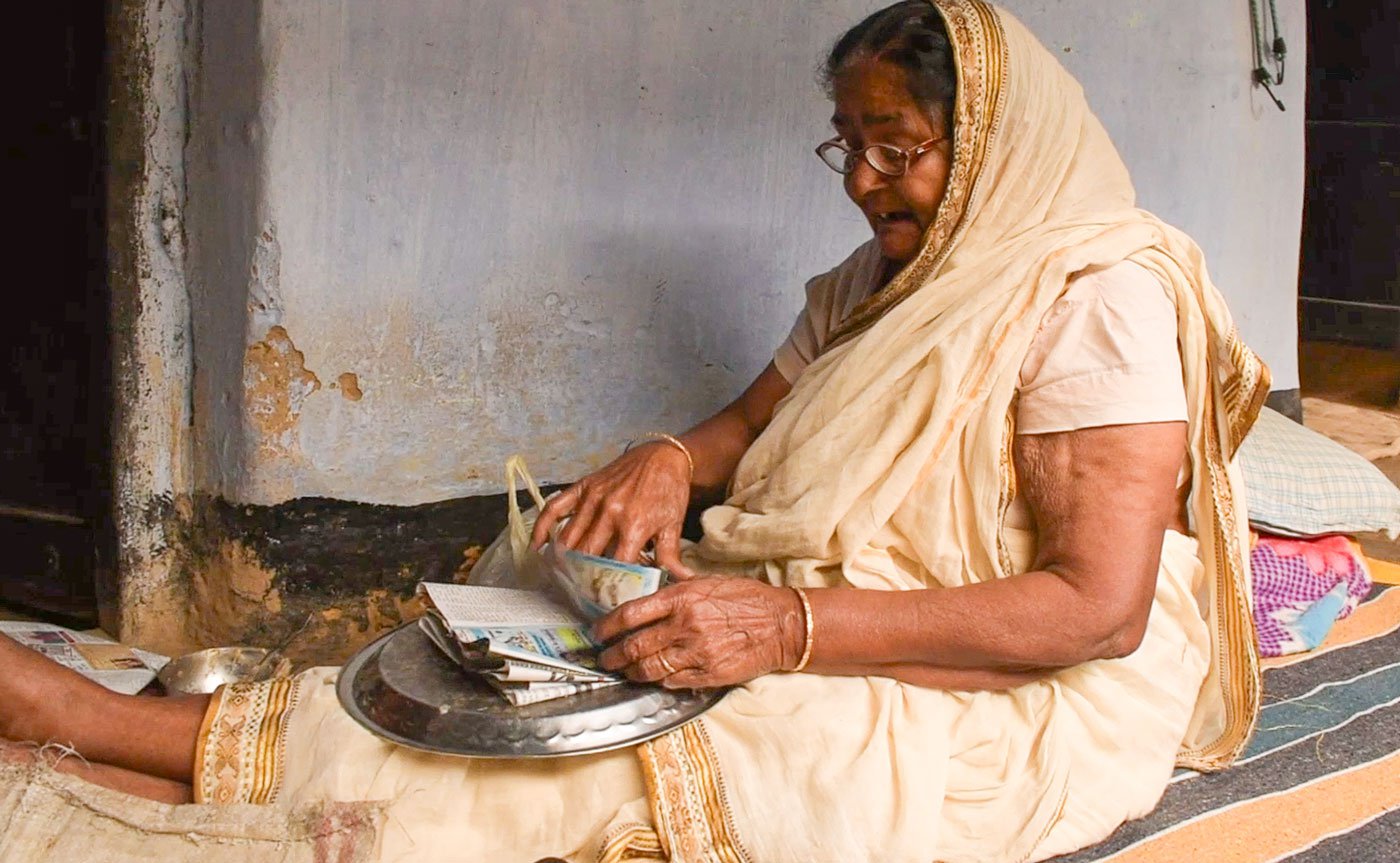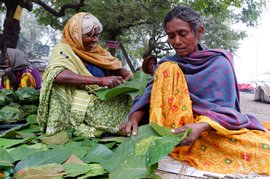Chobi Saha has been making paper packets for 25 years now. “First, I use a knife to divide a paper into three parts. That makes six pieces. Then I apply glue in circles. After that I fold the paper into a square and apply glue to the other side. This is how I make the packets,” she says.
The 75-year-old resident of Adityapur is talking to us as she sits working amidst the old newspapers strewn in the veranda and courtyard of her two-storeyed mud house.
When she started in 1998, her husband Anandagopal Saha was still alive. He looked after cows and goats of the people in the village and earned around Rs. 40–50 per day. “We were poor,” says Chobi Saha, who belongs to the Sunri community. “I decided to take up this work so that I could earn a little and feed myself.”
She began by collecting the newspapers discarded by her neighbours. Looking at the paper packets she got from local grocery shops, she taught herself how to make them. “I chose this work because all the materials are easily available and I can do it sitting at home,” she explains. “At first, I was slow, it took me 25 to 30 minutes to make a single packet,” adds Chobi.
“I could make only about a kilo [of bags] a day,” she continues.![Chobi Saha getting ready to make paper bags. ‘First, I use a knife to divide a paper into three parts. That makes six pieces. Then I apply glue in circles. After that I fold the paper into a square and apply glue to the other side. This is how I make the packets,’ she says as she works]](/media/images/02a-3-HM-No_newspaper_is_bad_news_for_Chob.max-1400x1120.jpg)

Chobi Saha getting ready to make paper bags. ‘First, I use a knife to divide a paper into three parts. That makes six pieces. Then I apply glue in circles. After that I fold the paper into a square and apply glue to the other side. This is how I make the packets,’ she says as she works
She would deliver the bags to the 8-9 grocery shops and small eateries in Bolpur selling local delicacies like chop and ghugni. She had to travel by bus every fortnight from her village in the Bolpur-Sriniketan block of Birbhum district for this. “I cannot go to Bolpur anymore,” she adds, because of a pain in her legs. Instead, she supplies the handful of shops in the village.
During the early days – two decades ago – she would get the papers for free. But, since newspapers were not very expensive, the packets made of them did not fetch much money either. “I [now] buy the papers at Rs. 35 a kilo,” says Chobi.
She lost her husband in 2004 when she was 56.
Her three sons are all married and have their own small businesses. She lives
in one part of the house and her youngest son Sukumar Saha lives in the other
part with his family. Her two older sons live six kilometres away in the town
of Bolpur.
Chobi Saha began by collecting the newspapers discarded by her neighbours. Looking at the paper packets she got from local grocery shops, she taught herself how to make them
Her day begins early in the morning – at 6 a.m. “I wake up and do my own work. Then I cut the papers at around nine o’ clock,” she says. After cooking and having her lunch, she spends a part of the afternoon resting.
In the evening, she goes out for a chat with the other women of the village. When she returns, she begins to make the packets again, applying glue to the papers. She has no fixed time of the day for making packets. “I do it whenever I get the time,” she says.” Often, she may perform a step in the process in between carrying out her household chores.
For instance, while cooking, she will sometimes go and lay the glue-smeared papers out to dry in the veranda and the courtyard. “Once I am done applying the glue, I spread them out in the sun to dry. Once they are dry, I fold them in half, weigh them, tie them up and take them to the shops.”
Chobi makes her own glue by heating flour she receives in ration shops.

Left: Chobi Saha at work in the verandah of her house. Right: Paper bags smeared with glue are laid out to dry in the verandah and courtyard


The resident of Adityapur lives in a mud house with three rooms with her youngest son Sukumar and his family
“Twice a week, I have to deliver packets weighing a total of one kilogram to the shops,” she informs us. The shops are all located within 600 metres of her house, allowing her to cover the distance on foot. “I make 220 packets which weigh a kilo,” and she is paid Rs. 60 per kilo, adding up to around Rs. 900–1,000 a month.
But Chobi’s packet-making days may be numbered: “People don’t read the papers anymore. They watch the news on their TVs and mobiles. So, there is a lack of newspapers [to make packets].”
The author would like to thank Tishya Ghosh for her help with the video




